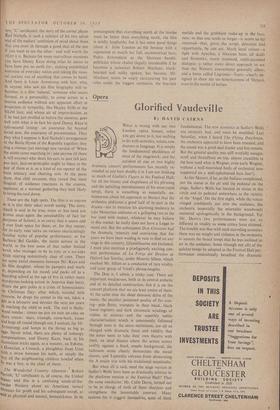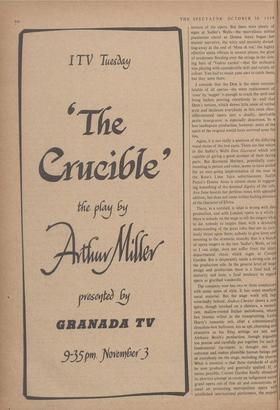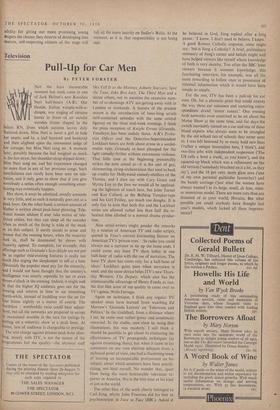Opera
Glorified Vaudeville
By DAVID CAIRNS WHAT is wrong with our two London opera houses, when you get down to it, has nothing to do with acoustics, voices, con- ductors or language. It is simply the fundamental shoddiness of most of the stagework; and the accident of one or two highly dramatic concert performances has recently re- minded us just how shoddy it is. I am not thinking so much,of Giulini's Figaro at the Festival Hall; for all the beauty and shapeliness of his phrasing and the unfailing melodiousness of his most rapid tempi, there is something so essentially un- humorous about his approach to Mozart that the orchestra abdicates a good half of its part in the drama—not to mention his alarming tendency to take Mozartian andantes at a galloping two in the bar (and with respect, whatever he may believe in this matter, he really does not have a Legge to stand on). But the subsequent Don Giovanni had the dramatic intensity and conviction that for years we have been waiting in vain to find on any stage in this country, Glyndebourne not excluded. I must also mention a prodigiously exciting con- cert performance of La Forza del Desthw at Oxford last Sunday, under Maurits Sillem, which marked Mr. Sillem as a conductor of rare vitality and rarer grasp of Verdi's phrase-lengths.
The Don is, I admit, a tricky case. There are important weaknesses, both in its central xsthetic and in its detailed construction, but it is on the concert platform that we are least aware of them. At the same time the sheer demonic drive of the music, the peculiar possessed quality of the scor- ing—pale flutes, trumpets in their bleak, black lower registers and dark chromatic windings of violins in octaves—and the superbly subtle characterisation which is consistently hollowed through even in the secco recitations, are all so charged with dramatic force and validity that the notes seem to take their own theatre with them, an ideal theatre where the action moves swiftly against a fixed, simple background, the ballroom scene clearly demarcates the social classes, and Leporello refrains from desecrating the A major trio with his traditional ineptitudes.
But when all is said, need the stage version at Sadler's Wells have been so drastically inferior to the platform version at the Festival Hall? That the same conductor, Mr. Colin Davis, turned out to be in charge of both of them sharpens and strengthens the lamentable contrast. Many reasons for it suggest themselves, none of them fundamental. The new acoustics at Sadler's Wells are certainly bad, and must be modified. Last Saturday, when I heard The Flying Dutchman, the orchestra appeared to have been reseated, and the sound was a good deal louder and less remote. But the general quality was still woefully meagre, shrill and threadbare on top, almost inaudible in the bass (and what is Wagner, even early Wagner, without a well-nourished body of orchestral tone supported on a well-upholstered bass line?).
As for Mozart, if he, as the Italians complained, put the statue in the pit and the pedestal on the stage, Sadler's Wells has located its statue in the circle and its pedestal somewhere in the vicinity of the 'Angel.' On the first night, while the voices winged confidently out into the audience, the orchestra (especially the miserable woodwind) muttered apologetically in the background. Yet Mr. Davis's two performances were not so different in vitality as some critics have claimed. The trouble was that with such starveling acoustics there was no weight and richness in the orchestra to sustain the broad tempi that he was inclined to set in the andantes. Some (though not all) of the quicker tempi he adopted in the Festival Hall per- formance undoubtedly benefited the dramatic tension of the opera. But there were plenty of signs at Sadler's Wells—the marvellous subito pianissimo chord as Donna Anna began her sinister narrative, the witty and masterly dwind- ling-away at the end of 'Meta di voi,' the highly effective senza vibrato in several places, the glow of tenderness flooding over the strings in the clos- ing bars of 'Vedrai carino'—that the orchestra was playing with considerable skill and variety of colour. You had to strain your ears to catch them, but they were there.
I concede that the Don is the most untrans- latable of all operas—the mere replacement of 'cend by 'supper' is enough to crack the spell and
bring bathos pouring relentlessly in—and that Dent's version, which shows little sense of verbal style and declasses everybody in this most class-
differentiated opera into a deadly, inevitable petite bourgeoisie, is especially disastrous. In a
less inadequate production, however, more of the spirit of the original would have survived none the less.
Again, it is not really a question of the differing vocal status of the two casts. There are fine voices
in the Sadler's. Wells Don Giovanni which are
capable of giving a good account of their taxing parts. But Raimund Herincx, potentially com- manding in person and voice, seems to have settled for an easy-going impersonation of the man in the Rose's Lime Juice advertisement. Judith
Pierce's Donna Anna is almost alone in suggest- ing something of the doomed dignity of the role. Ava June boards her perilous notes with splendid address, but does not come within hailing distance of the character of Elvira.
There, in a nutshell, is what is wrong with this production, and with London opera as a whole : there is nobody on the stage to tell the singers what to do: nobody to inspire them with a dramatic understanding of the great roles that are so care- lessly thrust upon them; nobody to give form and meaning to the dramatic anarchy that is a bunch of opera singers in the raw. Sadler's Wells, so far as I can judge, does not suffer from the inter- departmental chaos which rages at Covent Garden. But it desperately needs a strong arm on the production side. In the general level of stage design and production there is a fatal lack of maturity and taste, a fatal tendency to regard opera as glorified vaudeville.
The company now has two or three conductor; with some sense of style. It has some excellent
vocal material. But the stage work still lags wretchedly behind. Andrea Chenier shows a new spirit, though lavished on a chimera, a second' rate, shallow-rooted Italian melodrama, whose few blooms wither in the transplanting. Leslie Hurry's romantic sets, after a conventionallY chocolate-box ballroom, are as apt, charming and evocative as his Ring settings are not, and Anthony Besch's production, though arguahlY too precise and carefully put together for such a fundamental rip-roarer, is thought out and coherent and makes plausible human beings out of everybody on the stage, including the chorus. What is essential is that these standards of style' be now gradually and generally applied. If, a5 seems possible, Covent Garden finally abandon its abortive attempt to create an indigenous nativc grand opera out of thin air and concentrates in' stead on presenting metropolitan opera with established international performers, the respon" sibility for giving our more promising_ young singers the chance they deserve of developing into mature, self-respecting citizens of the stage will fall all the more heavily on Sadler's Wells. At the moment, as it is, that responsibility is not being met.












































 Previous page
Previous page